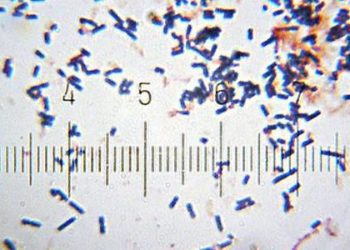Probiotics not effective in preventing necrotizing enterocolitis: The PiPS trial
1. In this multicenter, randomized controlled phase 3 study [PiPS trial], the primary outcomes of rates of necrotizing enterocolitis, blood culture positive sepsis more than 72 hours after birth, and death before discharge did not differ significantly between preterm infants receiving probiotic B breve (BBG-001) and those receiving placebo.
2. There were no probiotic-associated adverse events
Evidence Rating Level: 1 (Excellent)
Study Rundown: Previous trials have shown probiotics to be beneficial in reducing necrotizing enterocolitis and late-onset sepsis. The recommendation for the routine use of probiotic B breve in all preterm infants is supported by a recent Cochrane review including 24 studies and 5,500 infants. In this randomized controlled phase 3 study, the investigators aimed to assess whether probiotic Bifidobacterium breve BBG-001 was effective in reducing the primary outcomes of necrotizing enterocolitis, late onset sepsis, and death in preterm infants. Infants born between 23 to 30 weeks’ gestation were recruited and assigned to receive either probiotic (experimental group) or placebo (control group). The primary outcomes did not differ significantly in rates of occurrence. A strength of this study was its statistical power and its representation of the population at large. A weakness of this study is that the high colonization rate of the placebo group may have masked the benefits of the probiotic intervention.
The study was funded by UK National Institute for Health Research Health Technology Assessment Programme.
Click to read the study in The Lancet
Relevant Reading: Probiotics for prevention of necrotizing enterocolitis preterm infants
In-Depth [randomized controlled trial]: This multicenter, randomized controlled phase 3 trial aimed to assess the effectiveness of the probiotic Bifodobacterium breve BBG-001 in preventing the primary outcomes of necrotizing enterocolitis (Bell stage 2 or 3), blood culture positive sepsis more than 72 hours after birth; and death before discharge from hospital. Between 7/1/2010 and 7/31/2013, 1,315 Infants were allocated (1:1) to either experimental group (probiotic B breve BBG-001) or control group (dilute infant formula).
Primary outcomes between probiotic and placebo groups did not differ significantly. 61 (9%) infants in the probiotics group had necrotizing enterocolitis compared with 66 (10%) in the placebo group (adjusted risk ratio 0.93 [95% CI 0.68–1.27]); 73 (11%) infants in the probiotic group had sepsis compared with 77 (12%) in the placebo group (0.97 [0.73–1.29]); 54 (8%) deaths before discharge occurred in the probiotic group compared with 56 (9%) in the placebo group (0.93 [0.67–1.30]). Additionally, no benefit was detected for any secondary outcomes, including other measures of sepsis. Rate of other major neonatal morbidities were similar between the groups. There were two serious adverse events – one episode of toxic epidermal necrolysis and one massive pulmonary hemorrhage; however, these were considered unlikely to be related to the interventions.
Image: PD
©2015 2 Minute Medicine, Inc. All rights reserved. No works may be reproduced without expressed written consent from 2 Minute Medicine, Inc. Inquire about licensing here. No article should be construed as medical advice and is not intended as such by the authors or by 2 Minute Medicine, Inc.







